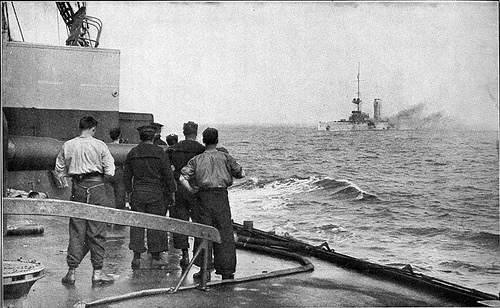First cases of shell-shock; Threat of invasion of Britain eases
Special to The Great War Project
(28 August) On the Western Front, the British retreat from Mons sparks an unexpected outcome.
According to historian Martin Gilbert the official British medical history of the war notes that “during 1914 several men were evacuated from France to England owing to having been ‘broken’ by their experience in the retreat from Mons.”
These are just the first examples of what military doctors characterize as “gross hysterical conditions” on the battlefield. It comes to be known as shell-shock.
On this day a century ago, new developments in the war at sea. All British troops are now in France. No defenders remain in the British homeland.
Britain faces the real threat of invasion.
But in the first significant naval battle between Germany and Great Britain, three German warships are sunk in the waters near Britain and three others damaged. Some 700 German sailors drown.
The British rescue 200 German sailors from the sinking ships.
The battle removes the danger of German invasion for the moment.
On land the French-British retreat from Mons and other lost battles continues. That means the German advance from its victories in Belgium and France continues.
On the Eastern Front, it’s Day 3 of the Battle of Tannenberg. The German maneuvers continue to baffle the Russian command, and the colossal Russian losses are beginning to emerge.
On this day, a century ago, according to historian Norman Stone….
…some 100,000 Russian soldiers surrender, with an additional 50,000 killed or wounded. The Russians also lose 500 guns.
The battle is labeled “an accidental miracle” because one German general fails to carry out orders and ends up better positioned to smash the Russian army than had he carried out those orders.
The ironies of war…..
Early on this day, it seems the German tactics do not work, only to discover late in the afternoon this same day that indeed the German tactics result in huge casualties on the Russian side and prompt massive Russian surrenders.
“At last the German generals allow themselves to exult,” writes historian Max Hastings, “confident that a huge victory was unfolding.”
Indeed it is. Hastings describes the desperate Russian situation.
“The remnants of the [Russian] Second Army began to fall back in chaos towards the Polish frontier. Over half [Russian General Alexander] Samsonov’s 230,000 men were dead, wounded or captured.
“His three attacking corps were shattered. Corpses lay scattered for miles.”

